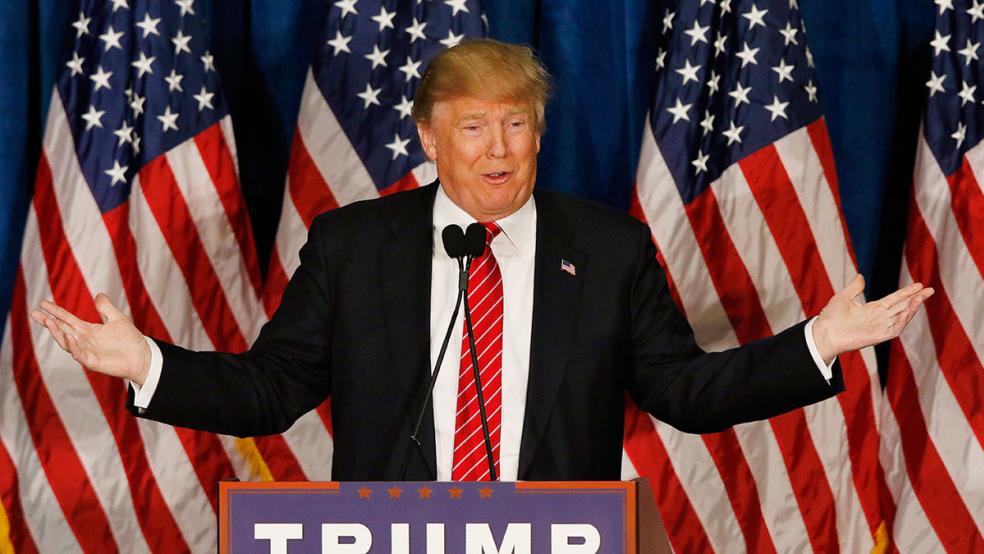While billionaire Republican frontrunner Donald Trump was denied a clean sweep of primary wins last night, his apparent victory in four out of five states that cast ballots further inflated his lead over the rest of the field as the GOP primary season passed the halfway mark on the trip to the nominating convention in Cleveland this summer.
Trump obliterated Marco Rubio in the Florida senator’s home state, 46 percent to 27 percent, forcing Rubio to abandon his presidential campaign altogether. He also won solid victories in Illinois and North Carolina. With 99 percent of the vote in, he also appears to have narrowly triumphed in Missouri, denying his closest rival, Texas Sen. Ted Cruz, even the consolation prize of a single statewide victory. His only outright loss was in Ohio, where sitting governor John Kasich won the 66 delegates available in that state’s winner-take-all primary.
Related: Kasich’s Strategy Paid Off in Ohio, But Can He Bag the Elephant?
Trump’s win in Florida garnered the real estate mogul 99 delegates in that winner-take-all contest. He also appears set to take the lion’s share of delegates from Illinois, and a majority from Missouri. His haul from North Carolina will be a more modest plurality because of that state’s proportional allocation rules.
With each step he takes toward the nomination, Trump appears to grow more disdainful of the press. Last night he hosted what was billed as a press conference at his gilded Mar-a-Lago resort in Florida, during which he railed against the “disgusting” news media.
He also placed his campaign manager Corey Lewandowski, currently facing charges that he assaulted a reporter last week, at his right side. Trump singled out Lewandowski for praise, saying, “Corey. Good job Corey. Great job.”
Trump walked off the stage at his supposed press conference without taking a single question from the assembled reporters.
Related: It Took Trump to Bring Obama and GOP Leaders Together
Kasich celebrated winning in Ohio – the state he represented in Congress for more than 20 years and where he is a twice-elected sitting governor – as though it were a major triumph. And in a sense, it was, in that it denied Trump the 66 delegates that were awarded there on a winner-take-all basis. In reality, though, the fact that a victory in his home state was ever in question points to the weakness of the Kasich campaign in the face of the Trump juggernaut.
It is mathematically impossible for the Ohio governor to win the nomination outright based on delegate counts. Ohio is his only victory so far, and could well be his only victory at all. Kasich’s only hope for winning the nomination relies on a contested convention, in which nobody wins on a first ballot, and delegates--freed from their obligation to vote for the candidate to whom they were pledged--migrate to Kasich.
It’s a long shot, and in describing his campaign as “the little engine that can” last night, he seemed to minimize the possibility in the face of what his biggest rival’s backers refer to as “the Trump Train.”
Cruz greeted his supporters by declaring, “Tonight was a good night.” But without a single statewide victory to boast of, and watching the delegate gap between him and Trump balloon from 90 to more than 200, it was hard to see what was particularly good about it for his campaign other than the departure of Marco Rubio and Kasich’s ability to defend his home state from Trump.
Related: Trump’s Invitation to Pro-Israel Conference Has Some American Jews Upset
The electoral map doesn’t get better for Cruz in the second half of the campaign. An extreme conservative, outspoken Christian, and dedicated culture warrior, his best chance to amass a large share of delegates was in the Deep South, a part of the country that Trump practically swept. The remaining states on the calendar are largely in the Northeast and West, regions where Cruz’s brand of conservatism doesn’t wear nearly as well.
As with Kasich, Cruz’s best hope at this point is to deny Trump an outright majority of the delegates before the nominating convention, and to press for victory after a first ballot proves inconclusive.
Last night marked the end of the Rubio campaign, and raises questions about what comes next for the young Florida senator. Rubio will leave the Senate at the end of his current term in January, but is widely expected to return to the political arena, either as a future presidential candidate or, perhaps, in a gubernatorial run in his home state.
“America is in the middle of a real political storm, a real tsunami,” he said in a speech marking the end of his campaign. Conceding that, “people are frustrated,” he nevertheless said that he was happy to have generally avoided the kind of anger stoking that has been Trump’s trademark throughout the campaign.
Related: Not So Fast, Donald: Fox Will Host Another GOP Debate
“From a political standpoint the easiest thing to do in this campaign…is to make people angrier, make people more frustrated,” he said. “But I chose a different route and I am proud of that.”
The three remaining candidates are supposed to appear in a Fox News-sponsored debate on Monday, but Trump has already said that he believes there have been enough debates and isn’t interested in participating in another one.
The Fox debate will take place the day before the next set of primary elections, in Utah and Arizona on March 22. The states have 98 delegates to offer, combined, fewer that Florida alone awarded last night. Arizona is the larger state, with 58 delegates in a winner-take-all contest. Utah, with 40 delegates, will distribute them proportionately, unless one candidate claims more than 50 percent of the vote.





